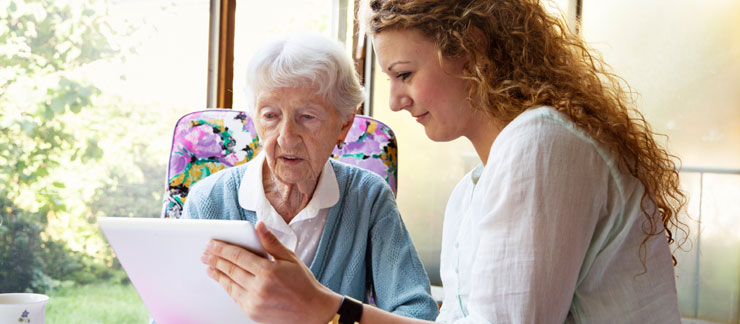
Best Apps and Digital Tools to Help You as a Caregiver
Caregiving is a full-time role. Whether you’re present in your loved one’s home on a daily basis or not, the emotional and mental weight of bearing full responsibility for another person can be overwhelming. And over time, if you don't add support and help, carrying that weight alone will lead to burnout.
But today's technology can reduce a caregiver's stress level.
Below are several tech tools to make your caregiving role more manageable.
Keeping in Touch
On any given day, you're communicating with doctors, therapists, family and friends, meal providers and more. Today's tech allows constant communication via emails, texts, phone calls, and more—which is great for today's on-the-go, multitasking caregivers.
And video technology (Skype, FaceTime, or Zoom, for example, all of which are free to use at a basic level) makes it easy for family separated by miles to SEE each other regularly.
But if your loved one is hospitalized, family and friends will want updates and news. And for caregivers, that can mean a ton of phone calls or texts.
CaringBridge is a free tool that helps you create a private website to which you can post all the details you want to share, including pictures or requests for/restrictions on visits, and share the link with the people of your choosing. You can also coordinate help through the site as well.
Managing Medications
About 87 percent of older adults (ages 62-85) living at home take at least one prescription medication, while 36 percent take five or more, according to JAMA Internal Medicine.
Medication management is complex, particularly for caregivers who have no formal medical training and for loved ones who may have more than one condition that can cause dangerous or even fatal interactions, side effects and more.
If the issue is one of compliance (i.e., "How do I make sure Mom takes her meds while I’m at work?”), Reminder Rosie is a personalized, voice-controlled reminder system that can help with medication reminders as well as reminders for appointments and everyday tasks.
MedCoach is a service, via GreatCall, that sends medication reminder messages to your phone and can connect you to your local pharmacy for refills.
PillPack works with many major insurance providers. It is a service that sorts and packages all prescriptions and over-the-counter medications by the dose, then ships them to the address of your choosing (boxes are secured and unmarked to prevent theft or tampering). Each PillPack dose is labeled with the date and time it must be taken, and any as-needed meds, or inhalers, creams and refrigerated items like insulin, are sent separately.
The Sagely SMART Weekly Pill Organizer is designed with seven large containers (able to store large pills) that fit on a magnetized base. The organizer includes a “PushThrough” feature, which allows you to push the pills from the lid into the container to improve loading accuracy. Lids indicate AM and PM and are color-coded and flexible for easy retrieval, with the days of the week printed in large lettering. You can also download the free Sagely Pill Reminder App, available for Apple and Android devices.
Delegating Care
Even if you’re good at asking others for help or delegating tasks, it can be a challenge keeping everyone on the same page and all the appointments and care tasks in one place. The “Care Calendar” by Lotsa Helping Hands is a great option, as are calendar programs tied to automated email/phone reminders, like Google, Outlook, or Apple. All are free.
Hint: Make sure to include reminders for yourself too, i.e. “take a self-care day” or “go get a massage” or “schedule lunch with a friend.”
Joining an Online Support Group
There are a number of closed groups on Facebook (i.e. Caregivers Connect and Caregivers and the Eldercare Community) where caregivers can safely share challenges, celebrate victories, vent about struggles and connect with others in similar caregiving situations.
If you can’t get to a brick-and-mortar location for a support group (or you don’t feel comfortable doing so), or if you need to connect more often than the group meets, you can search for various online support groups for caregivers 24/7 available on Caregiving.com.
If you're on Twitter, check out #ElderCareChat or #CareChat for regularly scheduled real-time conversations with caregivers from all walks of life.
Monitoring Falls
Many caregivers are constantly worrying about that middle-of-the-night call to say a loved one has fallen. Wearables like GreatCall’s Lively and personal emergency response systems (PERS) like the Medical Guardian can be quite helpful in ensuring quicker responses to falls or other health incidents and emergencies. In-home monitoring systems are also becoming more popular and accessible, though many are still cost-prohibitive for the average caregiver. Costs for these devices and systems vary.


